中考代词讲解练习和答案
- 格式:doc
- 大小:205.00 KB
- 文档页数:21
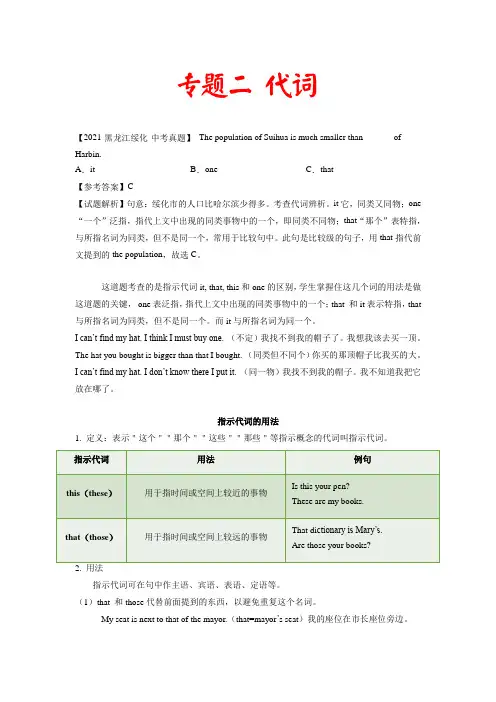
【2021·黑龙江绥化·中考真题】The population of Suihua is much smaller than ______ of Harbin.A.it B.one C.that【参考答案】C【试题解析】句意:绥化市的人口比哈尔滨少得多。
考查代词辨析。
it它,同类又同物;one “一个”泛指,指代上文中出现的同类事物中的一个,即同类不同物;that“那个”表特指,与所指名词为同类,但不是同一个,常用于比较句中。
此句是比较级的句子,用that指代前文提到的the population,故选C。
这道题考查的是指示代词it, that, this和one的区别,学生掌握住这几个词的用法是做这道题的关键,one表泛指,指代上文中出现的同类事物中的一个;that 和it表示特指,that 与所指名词为同类,但不是同一个。
而it与所指名词为同一个。
I can’t find my hat. I think I must buy one. (不定)我找不到我的帽子了。
我想我该去买一顶。
The hat you bought is bigger than that I bought. (同类但不同个)你买的那顶帽子比我买的大。
I can’t find my hat. I don’t know there I put it. (同一物)我找不到我的帽子。
我不知道我把它放在哪了。
指示代词的用法1. 定义:表示"这个""那个""这些""那些"等指示概念的代词叫指示代词。
指示代词用法例句this(these)用于指时间或空间上较近的事物Is this your pen? These are my books.that(those)用于指时间或空间上较远的事物That di ctionary is Mary’s. Are those your books?指示代词可在句中作主语、宾语、表语、定语等。
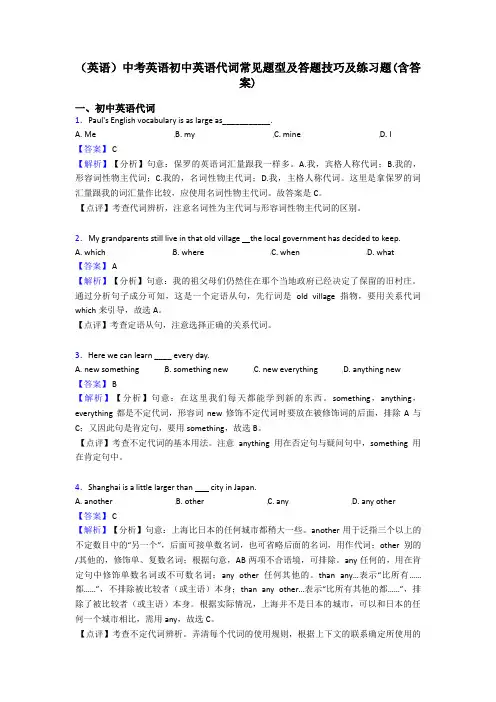
(英语)中考英语初中英语代词常见题型及答题技巧及练习题(含答案)一、初中英语代词1.Paul's English vocabulary is as large as___________.A. MeB. myC. mineD. I【答案】 C【解析】【分析】句意:保罗的英语词汇量跟我一样多。
A.我,宾格人称代词;B.我的,形容词性物主代词;C.我的,名词性物主代词;D.我,主格人称代词。
这里是拿保罗的词汇量跟我的词汇量作比较,应使用名词性物主代词。
故答案是C。
【点评】考查代词辨析,注意名词性为主代词与形容词性物主代词的区别。
2.My grandparents still live in that old village the local government has decided to keep.A. whichB. whereC. whenD. what【答案】 A【解析】【分析】句意:我的祖父母们仍然住在那个当地政府已经决定了保留的旧村庄。
通过分析句子成分可知,这是一个定语从句,先行词是old village指物,要用关系代词which来引导,故选A。
【点评】考查定语从句,注意选择正确的关系代词。
3.Here we can learn ____ every day.A. new somethingB. something newC. new everythingD. anything new【答案】 B【解析】【分析】句意:在这里我们每天都能学到新的东西。
something,anything,everything都是不定代词,形容词new修饰不定代词时要放在被修饰词的后面,排除A与C;又因此句是肯定句,要用something,故选B。
【点评】考查不定代词的基本用法。
注意anything用在否定句与疑问句中,something用在肯定句中。
4.Shanghai is a little larger than city in Japan.A. anotherB. otherC. anyD. any other【答案】 C【解析】【分析】句意:上海比日本的任何城市都稍大一些。
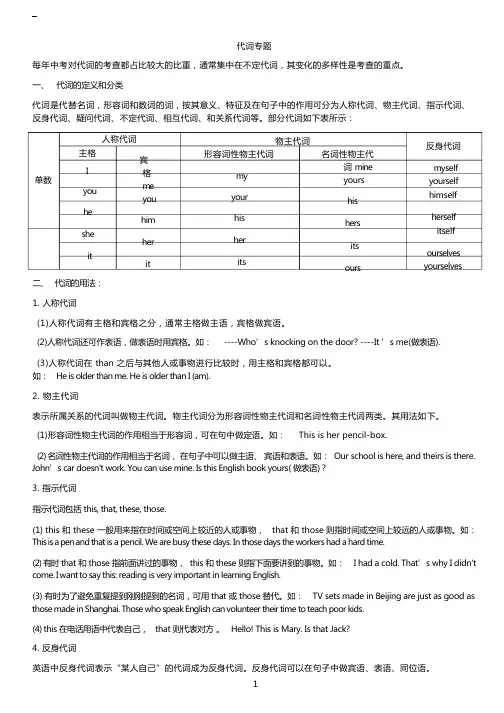
代词专题每年中考对代词的考查都占比较大的比重,通常集中在不定代词,其变化的多样性是考查的重点。
一、 代词的定义和分类代词是代替名词,形容词和数词的词,按其意义、特征及在句子中的作用可分为人称代词、物主代词、指示代词、 反身代词、疑问代词、不定代词、相互代词、和关系代词等。
部分代词如下表所示:二、 代词的用法: 1. 人称代词(1)人称代词有主格和宾格之分,通常主格做主语,宾格做宾语。
(2)人称代词还可作表语,做表语时用宾格。
如: ----Who’s knocking on the door? ----It ’s m e(做表语). (3)人称代词在 than 之后与其他人或事物进行比较时,用主格和宾格都可以。
如: He is older than me. He is older than I (am). 2. 物主代词表示所属关系的代词叫做物主代词。
物主代词分为形容词性物主代词和名词性物主代词两类。
其用法如下。
(1)形容词性物主代词的作用相当于形容词,可在句中做定语。
如: This is her pencil-box.(2) 名词性物主代词的作用相当于名词, 在句子中可以做主语、 宾语和表语。
如: Our school is here, and theirs is there. John’s car doesn't work. You can use mine. Is this English book yours( 做表语)? 3. 指示代词指示代词包括 this, that, these, those.(1) this 和 these 一般用来指在时间或空间上较近的人或事物, that 和 those 则指时间或空间上较远的人或事物。
如: This is a pen and that is a pencil. We are busy these days. In those days the workers had a hard time.(2) 有时 that 和 those 指前面讲过的事物, this 和 these 则指下面要讲到的事物。
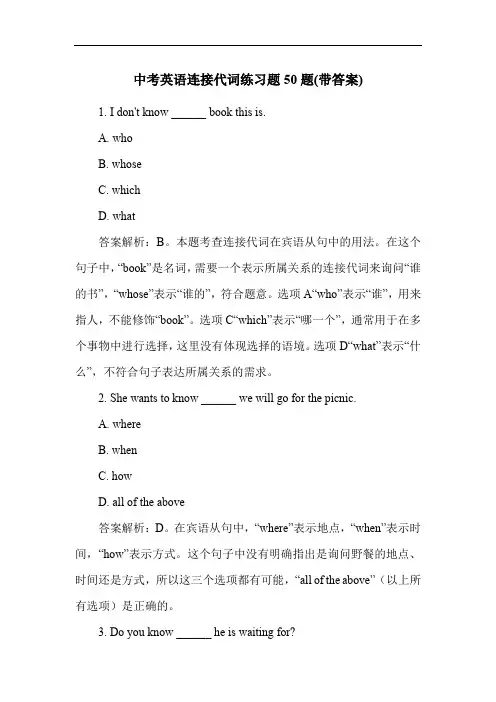
中考英语连接代词练习题50题(带答案)1. I don't know ______ book this is.A. whoB. whoseC. whichD. what答案解析:B。
本题考查连接代词在宾语从句中的用法。
在这个句子中,“book”是名词,需要一个表示所属关系的连接代词来询问“谁的书”,“whose”表示“谁的”,符合题意。
选项A“who”表示“谁”,用来指人,不能修饰“book”。
选项C“which”表示“哪一个”,通常用于在多个事物中进行选择,这里没有体现选择的语境。
选项D“what”表示“什么”,不符合句子表达所属关系的需求。
2. She wants to know ______ we will go for the picnic.A. whereB. whenC. howD. all of the above答案解析:D。
在宾语从句中,“where”表示地点,“when”表示时间,“how”表示方式。
这个句子中没有明确指出是询问野餐的地点、时间还是方式,所以这三个选项都有可能,“all of the above”(以上所有选项)是正确的。
3. Do you know ______ he is waiting for?B. whichC. thatD. why答案解析:A。
“wait for”是等待某人或某事,这里需要一个指人的连接代词,在宾语从句中作宾语,“whom”可以用来指人且作宾语,所以A正确。
选项B“which”通常用来指物或在一定范围内进行选择。
选项C“that”在宾语从句中无实际意义,这里需要一个有具体意义的连接代词。
选项D“why”表示原因,不符合句子语境。
4. The boy doesn't understand ______ his mother is so strict with him.A. whatB. whoC. whyD. when答案解析:C。
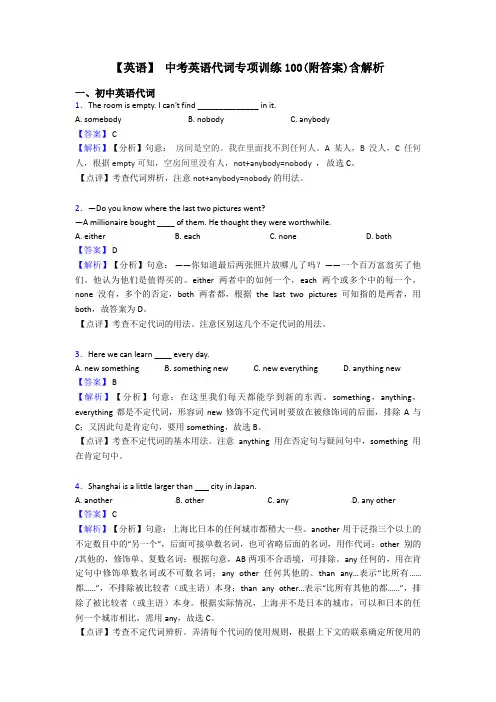
【英语】中考英语代词专项训练100(附答案)含解析一、初中英语代词1.The room is empty. I can't find ______________ in it.A. somebodyB. nobodyC. anybody【答案】 C【解析】【分析】句意:房间是空的。
我在里面找不到任何人。
A某人,B没人,C任何人,根据empty可知,空房间里没有人,not+anybody=nobody,故选C。
【点评】考查代词辨析,注意not+anybody=nobody的用法。
2.—Do you know where the last two pictures went?—A millionaire bought ____ of them. He thought they were worthwhile.A. eitherB. eachC. noneD. both【答案】 D【解析】【分析】句意:——你知道最后两张照片放哪儿了吗?——一个百万富翁买了他们。
他认为他们是值得买的。
either两者中的如何一个,each两个或多个中的每一个,none没有,多个的否定,both两者都,根据the last two pictures 可知指的是两者,用both,故答案为D。
【点评】考查不定代词的用法。
注意区别这几个不定代词的用法。
3.Here we can learn ____ every day.A. new somethingB. something newC. new everythingD. anything new【答案】 B【解析】【分析】句意:在这里我们每天都能学到新的东西。
something,anything,everything都是不定代词,形容词new修饰不定代词时要放在被修饰词的后面,排除A与C;又因此句是肯定句,要用something,故选B。
【点评】考查不定代词的基本用法。
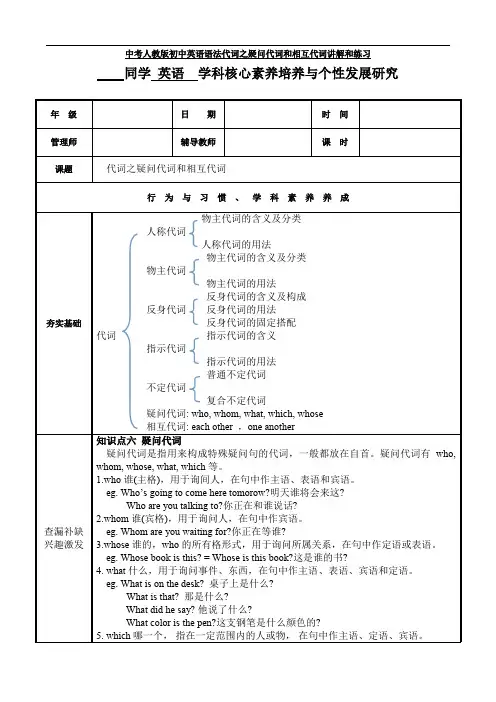
中考人教版初中英语语法代词之疑问代词和相互代词讲解和练习同学英语学科核心素养培养与个性发展研究一、根据汉语提示用适当的特殊疑问词填空。
1.这些苹果是谁的?apples are these?2.三加五等于多少?is 3 and 5?3.加拿大的人口是多少?is the population of Canada?4.哪一个MP4是你哥哥的?MP4 is your brother’s?5.你的新冰箱怎么样?is your new fridge?6.你还想要别的吗?do you want?7.你的爸爸正在和谁谈话?is your father talking to?二、单项选择1.-- is standing there? --Mr Zhang.A. WhatB. WhomC. Who2.would you like to go shopping with?A. WhichB. WhomC. WhatD. Where3.Excuse me, can you tell me is the way to the post office?A. whoseB. whichC. howD. what4.-- is your e-mail address(邮件地址)? --It’s xinxin@.A. WhoB. HowC. WhatD. Which5.-- does(do第三人称单数) your brother do?--He is a bus driver.A. WhereB. WhyC. WhatD. How6.-- can I do for you? --I would like a cup of tea.A. WhatB. HowC. WhichD. Who7.-- coat is more beautiful than yours? --Lily’s.A. WhichB. WhoseC. WhoD. What8.-- is the matter? --I have a headache(头疼).A. WhoB. WhatC. HowD. Which9.-- are you going to do this evening, Sally?--I’m going to do my homework.A.WhereB. WhatC. HowD. When1. Tom,Please pass ________ the glasses. I want to read the newspapers.A. youB. meC. himD. her2. The English novel is quite easy for you. There are ______ new words in it.A. a littleB. littleC. a fewD. few3. ---You want ________ sandwich?---Yes,I usually eat a lot when I’m hungry.A. otherB. anotherC. othersD. the other4. The doctors and nurses are doing their best to fight SARS. They think more of others than _______.A. theyB. themC. themselvesD. theirs5. ---Which do you prefer,a bottle of orange or a bottle of milk?---______________,thanks. I’d like a cup of tea.A. EitherB. NeitherC. BothD. None6. ---Oh!I came in a hurry and forgot to bring food.---Never mind. You can have ________.A. usB. oursC. youD. yours7. ---Can I come this evening or tomorrow morning?---_______ is OK. I’m free today and tomorrow.A. EitherB. NeitherC. BothD. None8. ---How are you going to improve _______ this term?---Work harder than last term.A. ourselvesB. myselfC. himselfD. yourself9. ---Could you tell me _______ she is looking for?---Her cousin,Susan.A. thatB. whoseC. whoD. which10. ---Is _______ here?---No. Li Lei and Han Mei have asked for leave.A. everybodyB. somebodyC. anybodyD. nobody11. Paul has _______ friends except me,and sometimes he feels lonely.A. manyB. someC. fewD. more12. If you want to book a round-trip ticket,you’ll have to pay ______ $ 30.A. moreB. otherC. the otherD. another13. ---Do you live by yourself,Mr Wang?---Yes. I have two sons. But ______ of them lives with me. They are now studying in America?A. neitherB. bothC. noneD. either14. ---Have you sent your parents an E-mail telling them you arrived safe?---No. _______ of them can use a computer.A. NoneB. BothC. NeitherD. All15. Who taught _______ English last term?Was _____ Mr. Smith?A. you; itB. you; heC. your; itD. your; that16. ---That woman has a bag in her right hand. What’s in her _____ hand?A. anotherB. otherC. oneD. the other17. We decided to go for a field trip with some friends of _______.A. usB. ourC. oursD. ourselves18. ---Is there a bus to the zoo?---I’m afraid there’s _______ bus to t he zoo.A. noB. anyC. someD. none19. You forgot your dictionary?You may have _______.A. meB. myC. mineD. myself20. This is ______ classroom. Where is _______?A. our; themB. us; theyC. our; theirsD. ours; theirs一、英语阅读理解专项练习试卷1.阅读理解“Please take my penny,” said Maggie to old Dan, the fisherman, who sat on a bench repairing his nets.Her brother Andrew drew her back, whispering, “Maggie, he is not a beggar (乞丐)!”But Maggie paid no attention. “Please take it,” she said again. Old Dan smiled, and took it. “Thank you, little miss,” he said, “It is kindly meant.”After that, Maggie went to the beach to gather shells. She never thought how fast the hours were passinguntil being tired. She sat down on a rock. Soon she was scared because the sea water was going up. She wanted to go home, but she found the places she had gone down easily very difficult to climb up. The stones were wet and smooth. What could poor Maggie do? She felt sad and cried.Luckily, Dan's large dog Rover jumped down from a rock! Rover raised his loud bark. The fisherman had taken his nets to the top of the cliffs (悬崖), and was laying them out in the sun when he heard the loud barking of a dog. He felt sure that it was Rover, and Rover was in trouble, so he looked over. There he saw it all.“Bless her! It is the little one that was so kind-spoken to me this morning!” he cried, and he hurried to his sons' rooms.“Quick, boys, quick!” he said. “Get to the boat, and row fast to the sea. There is a poor ch ild there just waiting to be helped.” The fishermen lost no time, and soon little Maggie and Rover were rowed safely to land! Old Dan was waiting there to lift her out to give her into her mother's arms.“It was the penny that did it, madam,” he said to Mrs. Weston later. “I saw Rover looking at her when she put the penny. And I am thinking he had been looking after her all the day.”Some years later, Rover came to Maggie's home with a little note, in which was written—“Will Maggie help Rover?—his m aster is dead.”(1)Who rowed Maggie to land safely?A. Rover.B. Old Dan.C. Old Dan's sons.D. Andrew.(2)What we can guess from the end of the story?A. Maggie refused to be Rover's new master.B. Rover felt sad about Mrs. Western's death.C. Rover lived with Old Dan until his master died.D. Maggie became Rover's master at once after she was saved.(3)What can we learn from the passage?A. One kind act brings another.B. You should act and speak the same kindly.C. One person's pleasure may be another's pain.D. People often forget what is really important in our lives.(4)Which of the following is the best title for the passage?A. Rover and his masterB. Rover's new friendC. What the brave dog didD. What Maggie's penny did【答案】(1)C(2)C(3)A(4)D【解析】【分析】这是一篇以麦姬的硬币引发的感人故事。
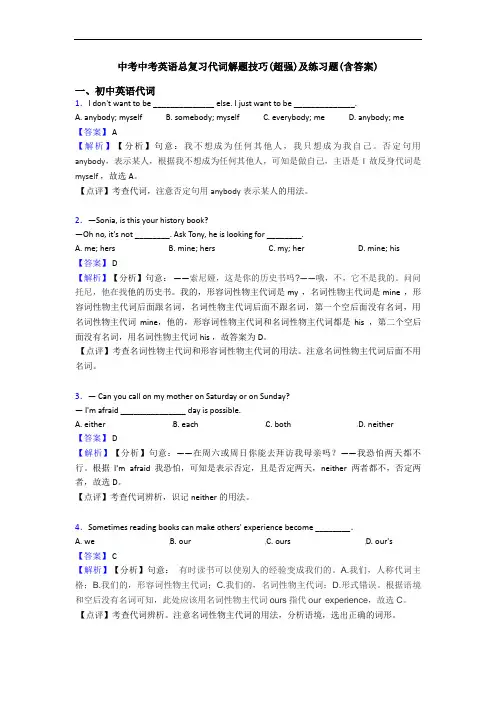
中考中考英语总复习代词解题技巧(超强)及练习题(含答案)一、初中英语代词1.I don't want to be ______________ else. I just want to be ______________.A. anybody; myselfB. somebody; myselfC. everybody; meD. anybody; me 【答案】 A【解析】【分析】句意:我不想成为任何其他人,我只想成为我自己。
否定句用anybody,表示某人,根据我不想成为任何其他人,可知是做自己,主语是I故反身代词是myself,故选A。
【点评】考查代词,注意否定句用anybody表示某人的用法。
2.—Sonia, is this your history book?—Oh no, it's not ________. Ask Tony, he is looking for ________.A. me; hersB. mine; hersC. my; herD. mine; his【答案】 D【解析】【分析】句意:——索尼娅,这是你的历史书吗?——哦,不,它不是我的。
问问托尼,他在找他的历史书。
我的,形容词性物主代词是my ,名词性物主代词是mine ,形容词性物主代词后面跟名词,名词性物主代词后面不跟名词,第一个空后面没有名词,用名词性物主代词mine,他的,形容词性物主代词和名词性物主代词都是his ,第二个空后面没有名词,用名词性物主代词his ,故答案为D。
【点评】考查名词性物主代词和形容词性物主代词的用法。
注意名词性物主代词后面不用名词。
3.— Can you call on my mother on Saturday or on Sunday?— I'm afraid _______________ day is possible.A. eitherB. eachC. bothD. neither【答案】 D【解析】【分析】句意:——在周六或周日你能去拜访我母亲吗?——我恐怕两天都不行。
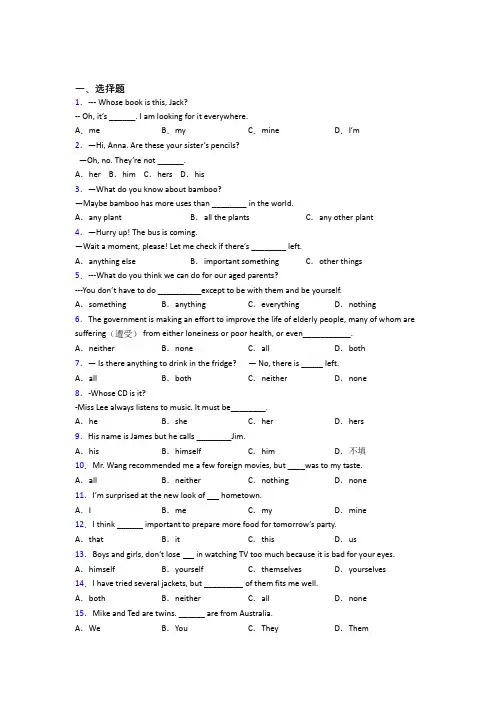
一、选择题1.--- Whose book is this, Jack?-- Oh, it’s ______. I am looking for it everywhere.A.me B.my C.mine D.I’m2.—Hi, Anna. Are these your sister’s pencils?—Oh, no. They’re not ______.A.her B.him C.hers D.his3.—What do you know about bamboo?—Maybe bamboo has more uses than ________ in the world.A.any plant B.all the plants C.any other plant 4.—Hurry up! The bus is coming.—Wait a moment, please! Let me check if there’s ________ left.A.anything else B.important something C.other things5.---What do you think we can do for our aged parents?---You don’t have to do __________except to be with them and be yourself.A.something B.anything C.everything D.nothing6.The government is making an effort to improve the life of elderly people, many of whom are suffering(遭受) from either loneiness or poor health, or even___________.A.neither B.none C.all D.both7.— Is there anything to drink in the fridge? — No, there is _____ left.A.all B.both C.neither D.none8.-Whose CD is it?-Miss Lee always listens to music. It must be________.A.he B.she C.her D.hers9.His name is James but he calls ________Jim.A.his B.himself C.him D.不填10.Mr. Wang recommended me a few foreign movies, but ____was to my taste.A.all B.neither C.nothing D.none11.I’m surpr ised at the new look of hometown.A.I B.me C.my D.mine12.I think ______ important to prepare more food for tomorrow’s party.A.that B.it C.this D.us13.Boys and girls, don′t lose in watching TV too much because it is bad for your eyes. A.himself B.yourself C.themselves D.yourselves14.I have tried several jackets, but _________ of them fits me well.A.both B.neither C.all D.none15.Mike and Ted are twins. ______ are from Australia.A.We B.You C.They D.Them16.When you come across new words in reading, it is not a good idea to in a dictionary at once.A.make up them B.look up themC.make them up D.look them up17.--The story is so amazing! It’s the most interesting story I’ve ever read.--But I’m afraid it won’t be liked by________.A.everybody B.somebody C.anybody D.nobody18.—I can’t believe Jim got first in the competition.— As you know, God helps those who help ______.A.yourself B.himself C.yourselves D.themselves19.The charity show lasted nearly three hours, but ______ left the hall early.A.nobody B.somebody C.anybody D.everybody20.I always believe that is difficult if we try our best to do it.A.something B.anything C.everything D.nothing 21.Sometimes nobody closes the door before leaving because everybody thinks ________ will do it.A.anybody B.everybody C.somebody D.nobody 22.—Our classroom is so clean. Do you know who cleaned it?—Sorry, I don't know. I think did it before class.A.anybody B.nobody C.somebody D.everybody 23.--What about these two coats, madam?--________ of them fits me. Could you show me ________ one?A.Either; other B.Neither; another C.Neither; else D.Either; another 24.It’s very nice __________ you __________ my parents your best wishes.A.of; sending B.of; to sendC.for; to send D.for; sending25.---When shall we meet again next week?---_____ day is possible. It’s no problem with me.A.Either B.Neither C.All D.Any【参考答案】***试卷处理标记,请不要删除一、选择题1.C解析:C【解析】【详解】句意:——杰克,这是谁的书?——哦,它是我的,我正在到处找它。
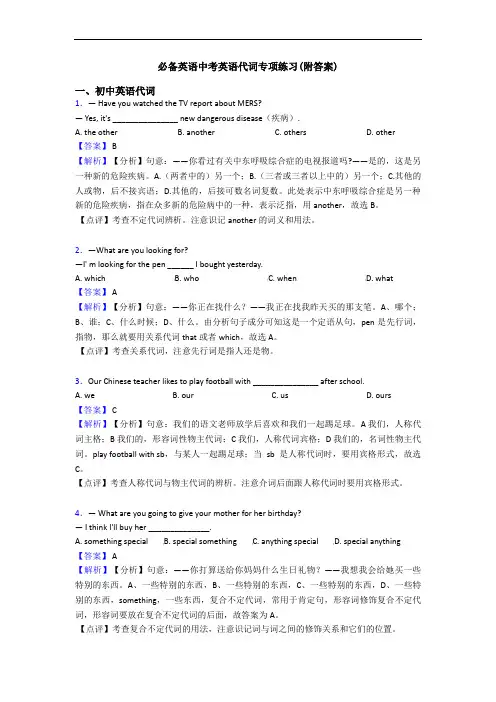
必备英语中考英语代词专项练习(附答案)一、初中英语代词1.— Have you watched the TV report about MERS?— Yes, it's _______________ new dangerous disease(疾病).A. the otherB. anotherC. othersD. other【答案】 B【解析】【分析】句意:——你看过有关中东呼吸综合症的电视报道吗?——是的,这是另一种新的危险疾病。
A.(两者中的)另一个;B.(三者或三者以上中的)另一个;C.其他的人或物,后不接宾语;D.其他的,后接可数名词复数。
此处表示中东呼吸综合症是另一种新的危险疾病,指在众多新的危险病中的一种,表示泛指,用another,故选B。
【点评】考查不定代词辨析。
注意识记another的词义和用法。
2.—What are you looking for?—I' m looking for the pen ______ I bought yesterday.A. whichB. whoC. whenD. what【答案】 A【解析】【分析】句意:——你正在找什么?——我正在找我昨天买的那支笔。
A、哪个;B、谁;C、什么时候;D、什么。
由分析句子成分可知这是一个定语从句,pen是先行词,指物,那么就要用关系代词that或者which,故选A。
【点评】考查关系代词,注意先行词是指人还是物。
3.Our Chinese teacher likes to play football with _______________ after school.A. weB. ourC. usD. ours【答案】 C【解析】【分析】句意:我们的语文老师放学后喜欢和我们一起踢足球。
A 我们,人称代词主格;B 我们的,形容词性物主代词;C 我们,人称代词宾格;D 我们的,名词性物主代词。
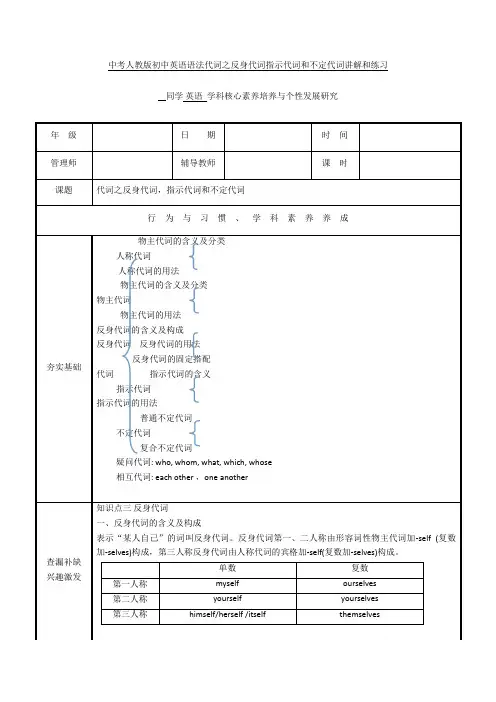
中考人教版初中英语语法代词之反身代词指示代词和不定代词讲解和练习同学英语学科核心素养培养与个性发展研究1.There are several pretty girls standing under the tree, but ______ are known to me.a. neitherb. nonec. no oned. all2.In one year rats eat 40 to 50 times ______ weight.a. itsb. andc. theird. theirs3.You’d better continue to use the same spelling of your name as ____ you used in your application.a. oneb. the onec. anyd. some one4.The little baby was left alone, with ______ to look after it.a. someoneb. anyonec. not oned. no one5.John can play chess better than ______ else.a. the oneb. no onec. any oned. another6.The weight of something is another way of describing the amount of force exerted on __ by gravity.a. itb. themc. thatd. one7.It is one thing to enjoy listening to good music, but it is quite ______ to perform skillfully yourself.a. otherb. anotherc. somed. any8.Children should be taught how to get along with ______.a. anotherb. otherc. othersd. any other9.The poor man lived on wild berries and roots because they had ______ to eat.a. nothing elseb. anything elsec. something otherd. nothing other10.I go to the cinema ______ day, Tuesdays, Thursdays, and Saturdays.a. each otherb. every otherc. this and the otherd. all other11.One of the properties of light is _____ traveling in wave form as it goes from one place to another.a. itb. it’sc. itsd. their12.______ in the world has been asked to do his duty for the human society.a. Each of the trampsb. Every of the trampsc. The each trampd. The every tramp13.In some restaurants, food and service are worse than ______ used to be.a. theyb. itc. themd. that14.Let the porter take all the baggage out and put ______ in the lobby.a. itb. theyc. themd. its15.Everyone who comes to the party is given a wooden apple with _____ own names cut in it as a souvenir.a. hisb. herc. theird. our16.Everybody in the class must give in ______ exercise book within the given time.a. theirb. ourc. hisd. her17.During the journey, the boys and girls entertained ______ with songs and games.a. themselvesb. theirselvesc. himselfd. itself18.You’d better buy ______ some fruits when you go on a trip.a. youselfb. myselfc. yourselfd. you19.The boys in this town like to bully ______.a. one anotherb. one and otherc. each otherd. one and the other20.One common family name is Black,______ is Anderson.a. anotherb. the otherc. othersd. none other21.I have two novels: one of the two is “Gone with the Wind’, and ______ is “the Tale of Two Cities’.a. anotherb. otherc. none otherd. the other22.All girls wear beautiful clothes. Some are dressed in red;______ in green.a. otherb. anotherc. othersd. none other23.She can’t seem to help herself. And ______ c an help her, either.a. none elseb. no one elsec. not anyd. somebody else24.Children can usually dress ______ by the age of five.a. himb. themc. hiselfd. themselves25.The gold watch had belonged to me for years, but the police refused to believe it was ______.a. meb. myc. mined. I’s26.Mother would not let Mary and ______ attend the hockey game.a. Ib. myc. med. we27.In a news conference this afternoon, the university announced that ______ intends to make sev eral important changes in next year’s budget.a. heb. itc. shed. they28.______ but a fool can make such a mistake.a. Everyoneb. No otherc. Not alld. None29.The poem by Browning is so observed that I cannot grasp ______ meaning.a. itsb. it’sc. theird. that30.The mayor felt that the police, in spite of the reports, had done ______ best.a. itsb. theirc. hisd. our31.I haven’t read ______ of the last four chapters, so I know little about them.a. anythingb. anyc. somed. something32.A pretty face may win friends but it takes character and personality to hold ______.a. itb. themc. thatd. one33.In the discussion, one speaker held that, since we live in a money-oriented society, the average individual cares little about solving ______.a. anyone else’s problemsb. anyone’s else problemsc. anyone else problemsd. problems of anyone else34.I don’t know whether small oranges are sweeter than big ______.a. thoseb. onesc. oned. that35.‘How much water is left in the bottle?’ ‘______’a. Nothingb. Nonec. Not somed. Not one36.It took two of them to do the work that ______ of us could do.a. someoneb. anyonec. any oned. everyone37.He has five children, and ______ of them is good at painting.a. everyoneb. everybody d. every one d. every38.I have three brothers,______ are in Beijing.a. no one of themb. neither of themc. some of themd. none of them39.Some of my students study a lot,______ just don’t care.a. anothersb. the otherc. some otherd. others40.As a matter of fact, Saudi Arabia’s oil reserves are second only to ______.a. Kuweitb. that of Kuweitc. Kuweits’sd. those of Kuweit41.This book of _______ used to be one of the best sellers in the shop.a. hisb. himc. that mand. this42.We should always keep ______ well-informed of the changing information.a. usb. oursc. ourselvesd. we二、英语书面表达专项训练2.中国传统文化源远流长,代代相传。
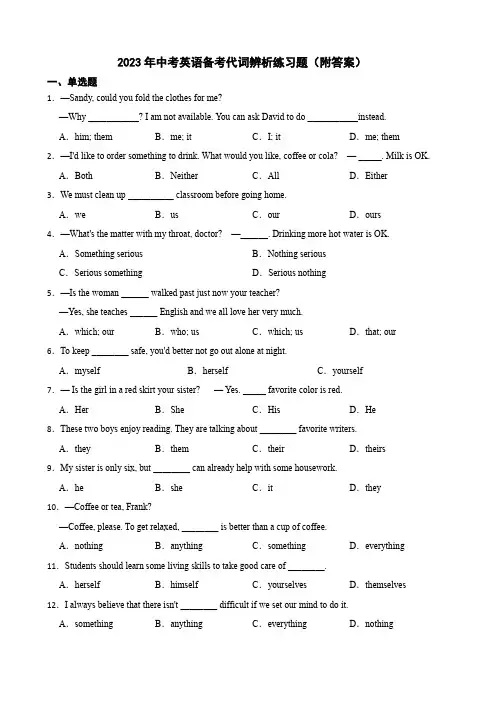
2023年中考英语备考代词辨析练习题(附答案)一、单选题1.—Sandy, could you fold the clothes for me?—Why ___________? I am not available. You can ask David to do ___________instead.A.him; them B.me; it C.I; it D.me; them2.—I'd like to order something to drink. What would you like, coffee or cola? — _____. Milk is OK.A.Both B.Neither C.All D.Either3.We must clean up __________ classroom before going home.A.we B.us C.our D.ours 4.—What's the matter with my throat, doctor? —______. Drinking more hot water is OK.A.Something serious B.Nothing seriousC.Serious something D.Serious nothing5.—Is the woman ______ walked past just now your teacher?—Yes, she teaches ______ English and we all love her very much.A.which; our B.who; us C.which; us D.that; our6.To keep ________ safe, you'd better not go out alone at night.A.myself B.herself C.yourself7.— Is the girl in a red skirt your sister? — Yes. _____ favorite color is red.A.Her B.She C.His D.He8.These two boys enjoy reading. They are talking about ________ favorite writers.A.they B.them C.their D.theirs9.My sister is only six, but ________ can already help with some housework.A.he B.she C.it D.they 10.—Coffee or tea, Frank?—Coffee, please. To get relaxed, ________ is better than a cup of coffee.A.nothing B.anything C.something D.everything 11.Students should learn some living skills to take good care of ________.A.herself B.himself C.yourselves D.themselves 12.I always believe that there isn't ________ difficult if we set our mind to do it.A.something B.anything C.everything D.nothing13.The mother encourages her little son to learn to look after ________ .A.hers B.herself C.his D.himself 14.Buses to the airport only come once every hour, and we just missed ________ . Why don't we take a taxi?A.another B.it C.one D.them15.Mary has a brother, and ______ name is Bob.A.her B.its C.his16.As the art festival is coming, they are preparing everything by ________.A.yourselves B.ourselves C.themselves17.The three heroes returned to the earth from space. We are proud of ________.A.me B.him C.them18.—How can we go to the library this Sunday, by bike or on foot? —________ is OK. It's up to you.A.Either B.Neither C.Both19.—Thank you for sharing the cake with ________. —It's ________ pleasure.A.me; mine B.I; my C.me; my20.—Why are you laughing, Tony? —There is ______ funny in the magazine.A.anything B.something C.everything D.nothing 21.Some animals move from one place to ____________at certain times of the year.A.another B.other C.the other D.others 22.—To go abroad or not to go after graduation, it's a question.—You may take __________ of the roads. But being home in the end matters.A.neither B.either C.both D.none23.I advise you not to show ________ on the WeChat because it may cause trouble.A.anything personal B.personal anythingC.something personal D.personal something24.These are my cousins. ________ are both university students.A.We B.You C.I D.They25.________went to Yang shuo for a holiday last Summer.A.We B.Our C.Us26.It's an either-or situation—we can buy a new bike or a new smart phone for you but we can'tbuy_______A.others B.another C.either D.both27.In the western countries, women often keep their ages to . Therefore, you'd better not ask the private questions like this.A.yourselves B.themselves C.ourselves28.My brothers and I promised to give up playing iPads, but of us made it.A.neither B.none C.either29.— What about these two coats, madam?— _______ of them fits me. Could you show me another one?A.Both B.Either C.Neither D.None30.— My school ID card is on the desk. What about ______?— It's in my schoolbag.A.his B.hers C.yours D.mine 31.—Look, Betty has a new mobile phone-Huawei Mate 40 Pro. How nice it is!—Yes. Her mother bought __________ for her progress.A.it B.one C.this32.—I hear chang'e -5 brought some sampled from the Moon to the Earth last year.—Yes. It makes _______ proud.A.we B.us C.our33.Mary's birthday is coming. We've decided to make a cake for_________.A.him B.her C.you D.them34.— ______ is in the classroom. Where are the students?—They are all in the chemistry laboratory.A.Somebody B.Anybody C.Nobody D.Everybody 35.Today is Frank's twelfth birthday. His mother bought a nice present for __________.A.her B.him C.them36."Did you do_______ fun on your vacation, Tara?" "Yes, I did. I went to Sanya."A.everything B.anything C.nothing37.—I am worrying about our final exam these days.—There is nothing to worry about ________ you work hard.A.until B.so that C.as far as D.as long as38.— What can we do for the left-home children in the village ________ need help?— We could help them with their study online on weekends.A.which B.whom C.whose D.who39.— We'll have the P.E. test next week. I feel a little nervous.— Relax! Believe in ________ and practice more.A.you B.your C.yours D.yourself40.— Excuse me, where is Xingguang Theatre?— Go along this road to the end, and you'll find ___________ on your left.A.it B.any C.one41.— There are mainly six kinds of tea in China. Which is your favorite?— Green tea, I guess. I've tried black tea, green tea and so on, and __________ of them have their special tastes.A.all B.both C.none D.neither42.This isn't my dictionary. is over there, on the desk.A.His B.Mine C.Hers D.Yours43.— Which of the two T-shirts do you want?— ________. One is too big and the other is too small. Could you show me another one?A.Either B.Both C.Neither44.I read two reports yesterday. One is about the Three child Policy (政策),_______ is about Mar exploration (探测).A.another B.the other C.other45.The population of Suihua is much smaller than _________of Harbin.A.it B.one C.that46.This pair of socks _________ soft. I'll take_______________.A.feel; it B.feels; it C.feels; them47.— Who's that boy over there?—______ is my cousin.A.You B.I C.He D.She48.My best friend and ________ were fixing up the broken machine when the rainstorm came.A.I B.me C.mine49.Amy hid under __________ desk in a hurry when the earthquake happened.A.she B.her C.hers D.herself 50.—Why are you laughing, Daniel?— There is _____________funny in the newspaper. Come and see.A.anything B.something C.everything D.nothing答案1.B 2.B 3.C 4.B 5.B 6.C 7.A 8.C 9.B 10.A 11.D 12.B 13.D 14.C 15.C 16.C 17.C 18.A 19.C 20.B 21.A 22.B 23.A 24.D 25.A 26.D 27.B 28.B 29.C 30.C 31.A 32.B 33.B 34.C 35.B 36.B 37.D 38.D 39.D 40.A 41.A 42.B 43.C 44.B 45.C 46.C 47.C 48.A 49.B 50.B。
中考中考英语总复习代词专项练习(附答案)一、初中英语代词1.Help ________ to some juice, children.A. youB. yourselvesC. meD. myself【答案】 B【解析】【分析】句意:孩子们,请随便喝点果汁。
A.你,人称代词主格或宾格;B.你自己,你们自己,反身代词;C.我,人称代词宾格;D.我自己,反身代词; help oneself to sth. 随便吃/喝……,固定短语,所以此处需要反身代词,排除A和C;根据句意和句中children可知,此处是指让孩子们随便喝点果汁,应该用你们自己,故选B。
【点评】考查固定短语和代词辨析。
注意固定短语help oneself to sth.的用法。
2.— It's very cold today.— Yes, the weather is much colder than ________ in my hometown.A. thatB. oneC. it【答案】 A【解析】【分析】句意:——今天非常冷。
——是的,天气比我家乡的天气冷许多。
根据句意可知是今天的天气和家乡的天气比较,weather天气,不可数名词,所以用that代指不可数名词,故选A。
【点评】考查代词辨析,注意平时识记比较时用that代指不可数名词。
3.Some exchange students will visit our school. _____________ will stay for a week.A. ThemB. TheyC. TheirD. Themselves【答案】 B【解析】【分析】句意:一些交换生要参观我们学校。
他们要停留一周。
A、他们,B、他们,C、他们的,D、他们自己,根据句子结构,可知缺少主语,再根据上文的some exchange students,是复数,可知要用they来指代,故选B。
【点评】考查人称代词,注意人称代词的用法。
代词专题选择题:1 These are ___books. Yours are over there.A IB myC meD mine1[答案]B.[析]这里应用形容词性物主代词2 —___is she? —She is a teacher.A WhatB HowC WhoD Where2 [答案]A.[析]这里的四个疑问词放在问句中全都成立,但其意义不同。
What is she?应译为“她的工作是什么?”或“她是做什么的?”而How is she?应译为“她身体如何?”而Who is she?应译为“她是谁?”其答语应为“她叫什么名字。
”而Where is she?应为“她在什么地方?”由答语决定了这道题的选择。
3___is wrong with my watch. It has stopped___.A Something, workingB Something, to workC Any thing, workingD Anything, to work3 [答案]A.[析]因为是肯定句所以应用Something,其后由于表停止工作了,则stop后要用动名词。
4 Mary, help ___to the bananas, please.A youB yourC yourselfD yourselves4 [答案]C.[析]help oneself to something为“自己拿某物”。
yourself为“你一个人”,而yourselves为“你们”。
5 —___do you go to school every day?—By bus.A HowB WhyC WhenD Where5. [答案]A.6 My skirt is___popular than___.A much, herB much, hersC more, herD more, hers6 [答案]D.[析]因句中有than,所以应选用比较级,而than后要选用名词性物主代词。
2023年中考语文代词专题练习(含答案)一、单选题1.下列解说不正确的一项是()A.我.倒很想知道,他们..的衣料究竟织得怎样了。
解说:本句中加点的词都是代词。
B.报纸杂志雄伟壮丽表扬与鼓励解说:这三个短语都是并列短语。
C.富有创造力的人总是孜孜不倦....地汲取知识,使自己学识渊博。
解说:本句中加点的成语使用正确。
D.这是一件珍贵的妈妈从北京买来的礼物。
解说:本句没有语病。
2.选出词语不完全同类的的一项()A.掌握劳动参观观察B.灿烂碧绿可爱贫苦C.神色世界思想明天D.我们那边这些非常3.下列句子中划线的词是指示代词的一项是()A.不知道在什么时候,出现了一个神通广大的女神,叫女娲。
B.我想知道他们的衣料织得究竟怎样了。
C.语文老师的办公室在哪儿?D.那里的天比别处的更可爱,空气是那么清鲜,天空是那么明朗。
4.下列有关汉语知识的说法,错误的一项是()。
A.汉语词语因带有或褒或贬的感情色彩,而被称为褒义词或贬义词,不带褒贬色彩的则是中性词。
B.反义词中一类是意义完全相反,如:美-丑;一类是意义相对,如:甜苦。
C.在汉语中,数词与量词一般结合起来使用表示数量,如:“一张课桌”中的“一张”表示课桌的数量。
D.在代词中,“我”“我们”“你”“你们”“它”“它们”都是代指人的人称代词。
5.下列说法错误的一项是()A.只要用心,词性区分并不难:“桌子”“头发”是名词;“强壮”“苍白”是形容词;“这”“他”是代词。
B.“令尊”“高寿”是敬辞,“家君”“寒舍”是谦辞。
C.汉语中不少词语带有感情色彩,如“见异思迁”“爱慕虚荣”是褒义词,“随声附和”“见利忘义”是贬义词。
D.人们常用反义词构成对比、映衬,使句子更具感情色彩和说服力。
如“虚心使人进步,骄傲使人落后”中,就有两组反义词“虚心”和“骄傲”,“进步”和“落后”。
6.下列知识判断错误的一项是()A.“欣赏诗歌可以唤起我们丰富的想象和情感的共鸣。
”句中划线的词依次是实词、虚词。
代词 一、概说 代词是起代替作用的词,通常用来代替名词以及起名词作用的短语、分句和句子。 代词与名词在形态上有所不同: 第一,许多代词有比名词多的表示人称、数、格与性的屈折变化; 第二,代词没有名词特有的派生词尾,如-tion, -ment等。
代词之间相异之处也很多,有的可以随便选用,有的则不能;有的可用作替换词,有的则不能;有的有屈折变化,有的则没有;有的可用作形容词,有的则不可。
但是,代词之间也有两点相同之处: 第一,代词本身的词义都很弱,必须从上下文来确定; 第二,许多代词都有两种功用:一是可以单独取代名词的位置,二是起修饰语的作用。
代词的种类: 代词可以分为九大类。 1. 人称代词 2. 物主代词 3. 反身代词 4. 相互代词 5. 指示代词 6. 不定代词 7. 疑问代词 8. 关系代词(主要用于定语从句的引导) 9. 连接代词(主要用于宾语从句、表语从句和主语从句的引导)
中考主要考查前八类,尤以黄底部分为重点。 基本用法(考查主宾格之分) 特殊用法 基本用法:指天气、时间、距离、非确指 人称代词 it 不清楚性别 作形式主语、形式宾语 种类 名词性物主代词 物主代词 形容词性物主代词 名词性物主代词与形容词性物主代词的区别 种类、基本含义 反身代词 功能 含有反身代词的固定习语 相互代词 基本含义、功能、与反身代词的区别 种类、基本含义 指示代词 一般功用 特殊功用 替代功能 用作副词 some, any 基本用法(考查肯否定句的使用差别) 特殊用法(考查some用于一般疑问句) no both, neither, either 基本用法(考查肯否定的区别) both / neither / either of.. 邻近一致原则 neither (以及nor, so)用于倒装句(考查引导词、谓语动词和语序) all, none 基本用法(考查含义的区别) all / none of… other, another another 泛指 other one…the other… other + 名词 / others the other + 名词 不 others 定 one 一般用法 替代功能 修饰词 代 (a) little, (a) few(修饰可数与不可数的区别) 词 many, much, a lot of / lots of (many, much 的区别) each, every 复合不定代词 基本用法(考查含义的区别) 功能 谓语 修饰语后置 疑问代词 基本用法(考查含义的区别) who 与what 的区别 what 与which的区别 种类、含义(考查疑问代词的选用) 疑问代词 who与what 的区别 what 与which 的区别 关系代词 (详见定语从句) 种类、使用环境 缩合连接代词 具体使用情况 引导让步状语从句 二、人称代词 种类 基本用法 主格:主语 宾格:宾语、表语 特殊用法 I 单独使用 as, than 三种人称的排列顺序 he, she 的特殊指代 特别企划it 非人单三 指天气 指时间 指距离 不清楚性别 非确指 形式主语 形式宾语
人称代词表示人,有人称、性别、数与格之分。 数格 人称 单数 复数 主格 宾格 主格 宾格 第一人称 I me we us 第二人称 you you you you
第三人称 阳性he him they them 阴性she her
中性it it
1. 人称代词的基本用法 人称代词在句中可用作主语、宾语和表语等。 1)作主语(一般用主格)。 e.g. I am a teacher. And you are my student. 2)作宾语(一般用宾格)。 e.g. I saw you in the street that day. You can teach me some other subject. 3)作表语(一般用宾格)。 e.g. The person who will teach you English is me. [真题] 1. Mr. Wang is very friendly, and ______ like him very much.(09.北京) A. we B. us C. our D. ours 2. --- Look, that’s Mike, your classmate. --- Yes. Let’s go and say hello to ______.(09,吉林通化) A. him B. he C. her D. hers 3. I’m going skating. Would you like to go with ___?(08,北京) A. me B. I C. my D. mine 4. We like Mr. Green because he often tells ______ funny stories in class. (08,重庆) A. we B. us C. our D. ours 5. —A latest China daily, please! —Only one copy left. Would you like to have , sir? (06,山东滨州) A.it B.one C.this D.that
2. 人称代词的特殊用法 1)I 无论何时都要大写。 2)人称代词作表语时,若其后有who或that引导的从句,则常用主格。 e.g. It’s I who did it. 3)人称代词单独使用时,一般用宾格。 e.g.—I’d like to drink some juice. —Me, too. 4)人称代词用于as 或than的后面,既可以用主格,也可以用宾格。 e.g. He is older than I / me. Edward is as good a student as he / him. 注意:此时使用主格还是宾格,应视比较情况有选择的使用。如: I like you better than he. 我比他更喜欢你。(为避免歧义,此时可以将than引导的比较状语从句的谓语补上:I like you better than he does.) I like you better than him. 我喜欢你,超过喜欢他。(此时只有一种解释) 5)人称的使用顺序习惯 如果有几个不同的人称同时作主语,习惯顺序是: 单数:you, he, and I 复数:we, you, and they e.g. You, he and I should set good examples to others. We, you and they are all winners. 但是,若是做错事,需承担责任,有时将说话者I 放在第一位。如: e.g.—Who broke the window? —I and Li Ming. 6)he, she 的特殊指代 ○1 she 可以用来代替国家、船只、大地、月亮等。
e.g. China is my homeland. I will love her forever. ○2 人们常用she或he 来代替已知性别的动物,雄性动物用he, 雌性动物用she。
e.g. I have a pet dog. She is very lovely.
3. 多功能的it 1)一般情况下,it表示除人以外的单数的动物或东西。 e.g. —Where is your car? —It is over there. [真题] 1. —What are you looking for, Sally? —I’m looking for my pen. I can’t find ______ anywhere. (09,龙岩) A. one B. it C. this 2.—Have you heard the good news? —No, what _______?(08,苏州) A. is it B. is there C. are they D. are those 3.---What a hot day! Have you had a drink? ---Yes. But I’d like to have _____ after work. (07,江西) A. it B. one C. other D. another 4. I can’t find the pen I was given. Have you seen _____?(06,徐州) A. it B. one C. this D. that
2)表示天气、气候。 e.g.—What’s the weather like today? —It’s rainy and cold. 3)表示时间。 e.g.—What time is it? —It’s a quarter past ten. 4)表示距离。 e.g.—How far is it from your home to school? —It’s about one kilometer. 5)当说话者不清楚或没有必要知道所谈论的对象的性别时,常用it来表示。 e.g. It’s a lovely baby. Is it a boy or a girl? —Someone is knocking at the door. —It must be Julie. I called her to come to dinner. [真题] 1.—Oh, there's someone in the room. —________must be my brother. (08,青海) A. He B.This C.It 2. —Who is singing in the classroom ? — must be Susan . (07,天津) A. She B. It C. This D. He 3.—John,someone in your class phoned you this morning. —Oh,who was ______?(06,江西) A.he B.she C.it D.that 6)有时为非确指。 e.g. How is it going with you? 近况如何阿? Take it easy! 别着急,慢慢来! 7)作形式主语,代替真正的主语:不定式短语、动名词短语、某些名词性从句。 e.g. It’s difficult to learn any subject unless you like it. It’s no use going there so early. It doesn’t matter whatever you do. [真题] 1. ---They are discussing what to do for the disabled. --- ___________is necessary to provide them with more positions. (08,湖北宜昌) A. That B. This C. It D. There 2. _________ is impolite to cut in line when you are waiting for a bus. (08,孝感) A. This B. That C. It D. Which 3. _____ is true that he will come to see us this evening. (07,陕西工大附中) A. He B. This C. That D. It 8)作形式宾语,代替真正的宾语:不定式短语、动名词短语、某些名词性从句。 e.g. I find it interesting to learn a foreign language.